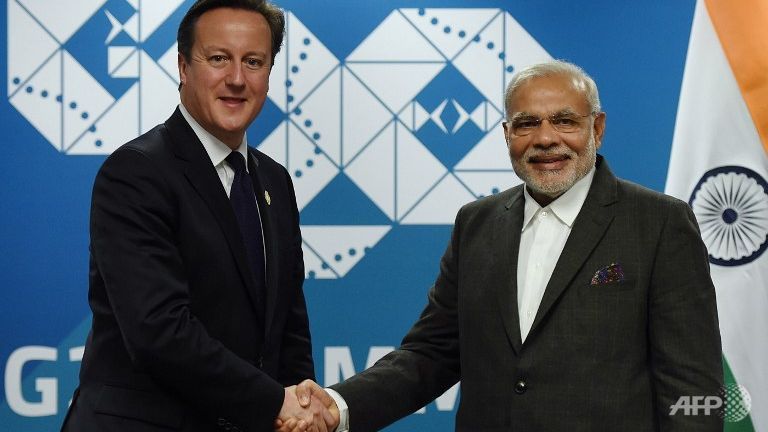UK, India eye trade deals during Modi visit
 |
| File photo: Britain's Prime Minister David Cameron (left) shakes hands with India's Prime Minister Narendra Modi during a bilateral meeting on the sidelines of the G20 Summit at the Brisbane Convention and Exhibitions Centre (BCEC) in Brisbane. (Photo: AFP/Files/Lukas Coch/Pool) |
LONDON: India's Prime Minister Narendra Modi on Thursday (Nov 12) began a three-day visit to London focused on trade deals and connecting with the diaspora as critics warned of a "rising climate of fear" under his rule.
Nearly 200 literary figures including author Salman Rushdie signed an open letter urging David Cameron to demand that Modi provide "better protection" for critical voices such as writers and artists and raise the issue of freedom of expression.
Modi will hold talks with Cameron and become the first Indian prime minister to address both Houses of Parliament later on Thursday.
On Friday, he meets Queen Elizabeth II and addresses a huge rally at Wembley Stadium where 60,000 British Indians are expected.
The trip will be the first time an Indian prime minister visits Britain in nearly 10 years and is expected to yield billions of dollars (euros) worth of deals, including India buying more BAE Systems Hawk trainer jets for its armed forces.
The red-carpet reception from Cameron's government will be a stark reversal of fortune for Modi, who had effectively been banned from Britain until three years ago over anti-Muslim riots which killed over 1,000 people in 2002 in Gujarat, when he was chief minister of the state.
The 65-year-old on Friday will appear at a huge rally at Wembley Stadium, which will include a free concert and a huge Diwali fireworks display.
"This isn't just a historic visit. It's a historic opportunity," Cameron said ahead of the visit. "It's an opportunity for two countries, tied by history, people and values, to work together to overcome the biggest challenges of our age."
India is the world's ninth-largest economy and, at 7.4 percent, has the fastest growth rate in the G20.
Former colonial power Britain is the fifth-largest world economy. The government is pushing hard to increase overseas trade as it tries to shrink its large deficit in the wake of the 2008 financial crisis.
Cameron promised in 2010 to double Britain's trade with India by this year. He has visited the country three times, but the trade figure has barely increased.
Gareth Price of London-based foreign affairs think-tank Chatham House said Britain was lower down India's pecking order than other nations such as Japan or Germany. "A lot of countries are wooing India with deeper pockets and without the historic baggage," he told AFP.
Price added that India's "number one" ask from Britain was usually more visas for Indian nationals. But he stressed this was "problematic" for Cameron, who has been struggling to reduce immigration since taking power five years ago.
STALLED REFORMS?
Downing Street said the visit would include announcements on "masala bonds" - rupee-denominated bonds which would allow Indian companies to issue debt in London.
Ahead of the visit, Modi's government this week announced plans to liberalise its foreign direct investment (FDI) regime in areas including defence, banking and construction. Britain is the third-largest source of FDI in India.
The move is seen as a bid by Modi to counter accusations that his reform drive is stalling, highlighted by his Bharatiya Janata Party's (BJP) bruising defeat Sunday in elections in the state of Bihar.
Modi, a Hindu nationalist, is likely to face a string of protests during his visit.
A group calling itself "Modi Not Welcome" is organising a demonstration outside Downing Street during talks with Cameron, accusing Modi of creating an "authoritarian culture" in India.
Some 46 MPs, including the leader of the opposition Labour party Jeremy Corbyn, have signed a parliamentary motion urging Cameron to raise human rights issues with the Indian government.
Cameron's spokeswoman said that "nothing is off the table" in the talks but stressed that a "strong and close relationship" with India was important.
What the stars mean:
★ Poor ★ ★ Promising ★★★ Good ★★★★ Very good ★★★★★ Exceptional
Latest News
More News
- Russian President congratulates Vietnamese Party leader during phone talks (January 25, 2026 | 09:58)
- Worldwide congratulations underscore confidence in Vietnam’s 14th Party Congress (January 23, 2026 | 09:02)
- Political parties, organisations, int’l friends send congratulations to 14th National Party Congress (January 22, 2026 | 09:33)
- 14th National Party Congress: Japanese media highlight Vietnam’s growth targets (January 21, 2026 | 09:46)
- 14th National Party Congress: Driving force for Vietnam to continue renewal, innovation, breakthroughs (January 21, 2026 | 09:42)
- Vietnam remains spiritual support for progressive forces: Colombian party leader (January 21, 2026 | 08:00)
- Int'l media provides large coverage of 14th National Party Congress's first working day (January 20, 2026 | 09:09)
- Vietnamese firms win top honours at ASEAN Digital Awards (January 16, 2026 | 16:45)
- ASEAN Digital Ministers' Meeting opens in Hanoi (January 15, 2026 | 15:33)
- ASEAN economies move up the global chip value chain (December 09, 2025 | 13:32)
















 Mobile Version
Mobile Version